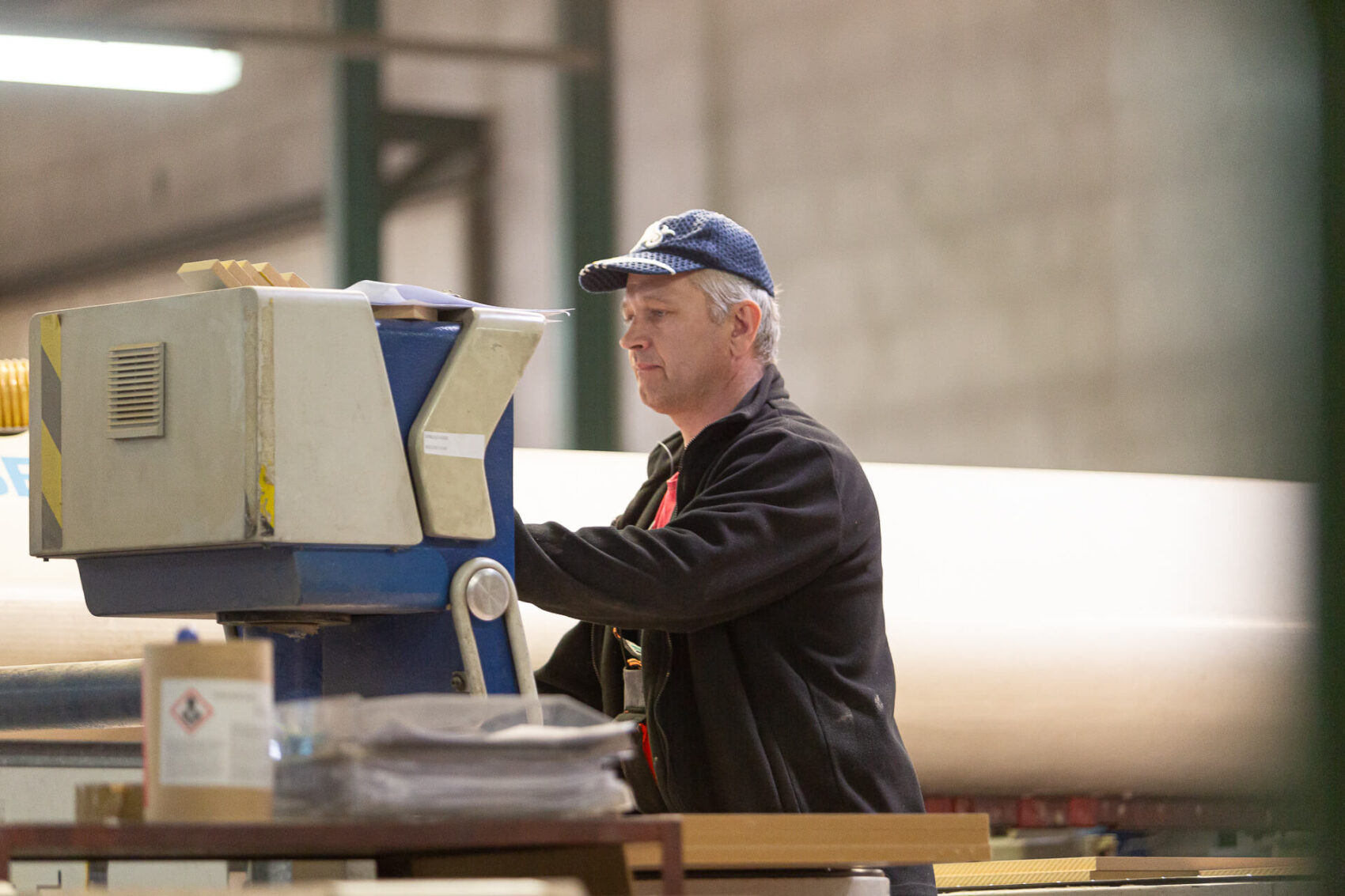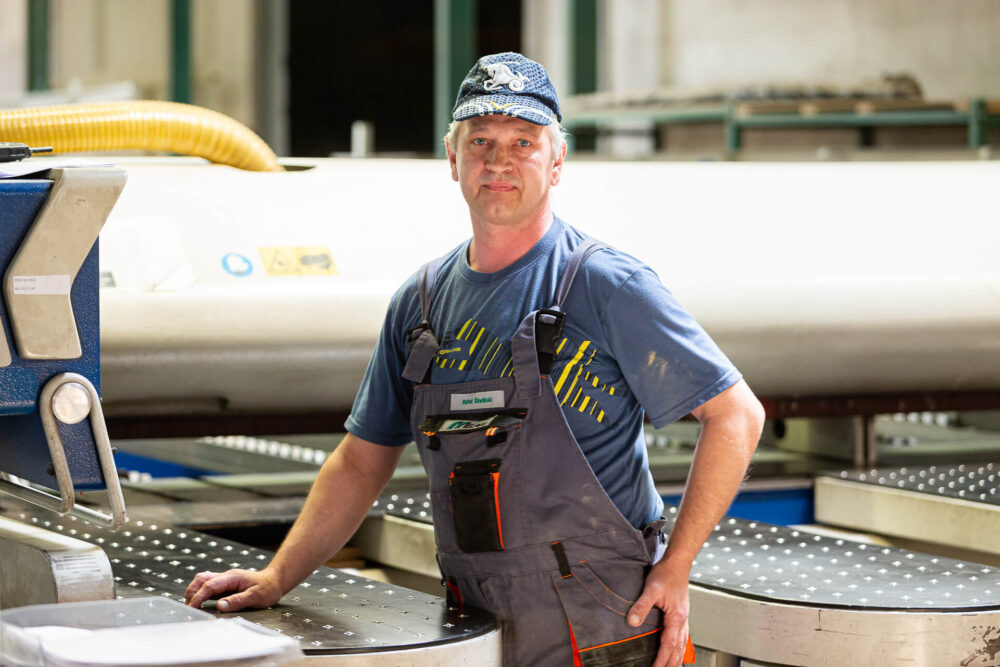This website uses cookies so that we can provide you with the best user experience possible. Cookie information is stored in your browser and performs functions such as recognising you when you return to our website and helping our team to understand which sections of the website you find most interesting and useful.
Twenty-five years in one company is a long time. What made you stay in Melaco for all so long?
It just happened (laughs). When I came to Melaco, there weren’t as many opportunities in Nowa Sól as there are now, no economic zone, and no other companies. I worked here, learned my tasks, understood the machines I operate and decided to stay here for now. And “for now” turned into 25 years.
Do you remember your beginnings in Melaco? You joined the team in the year of the famous flood in 1997. How did it affect the first months of work?
I started work in March and the flood was in July. Together with it, the struggle to maintain and secure the plant began. There was less actual work back then, but we had round-the-clock shifts during which we took turns to supervise the plant’s premises. The entire entrance gate was covered with sandbags and we made sure the interior was secured.
Also read: 19 years in Melaco. An interview with Dariusz Hańczyk
After the flood, the Melaco crew returned to their standard tasks. Have you been working on the same production processes all the time since 1997?
From the beginning, I have been working on a veneer for profiled strips, now also on a panel saw. When I started in Melaco, I was also operating machines that are no longer in the plant.
The machinery park has been modernized over time. Was it hard to learn to use the new tools and devices?
Not anymore. The new machines came in the few years since I started, I was young then, so it must have been a lot easier to learn about the new stuff. Today it could be more difficult (laughs). A lot of the machines that appeared were already based on numerical technology, milling machines appeared. Previously, we also used numerical devices, but of an older generation. There were also machines that had to be set manually.
Numerical technology requires knowledge to set devices and define parameters. Precision is also important, right?
Definitely. We perform cutting operations on a panel saw with an accuracy of 0.2 mm. We have to stick to it, because if we make a mistake, other machines on the plant will not process the element. So we have to use calipers, rulers, measures, make accurate measurements so that everything is correct and the element can go to further processing.
Also read: Machine operator job in Melaco. Interview with Przemysław Kopaczewski
As a person with extensive experience, you teach new crew members. How long does such an employee need to become an independent operator of, for example, a panel saw?
I think a couple of months. The machine may not be complicated, but you need to work on it a bit to be able to handle it well. You can learn a lot from just looking at a computer and what I do. I think that about 4-5 months is the time when an employee can start working on this device independently.
What else has changed at Melaco in terms of the plant itself in the last 25 years?
The plant is definitely bigger. In the beginning there were only two halls, today there are more of them, we also have a laboratory. Many more people used to work in these two halls than today in the entire plant. The work is more automated, the ability to use machines is more important than the manual work we did 25 years ago.
In the past it was easier to work than today?
In the past we certainly had fewer responsibilities. An employee would come, set the machine up and we would work on that machine. Today you have to set everything up yourself, measure, count and write out the papers. So there is more responsibility, but it also makes it better, more interesting.
Also read: Melaco from the financial side. An interview with the Chief Accountant, Aneta Wisłocka

The production of furniture elements is your everyday life. Are you also passionate about furniture after work, do you pay attention to furniture?
If I buy furniture, a furniture set for a room or a kitchen, I know what to look for in order to choose a better quality product. Sometimes I make suggestions to my friends or family, because certain details that are invisible to an ordinary person are immediately visible to us. But I wouldn’t call it a passion.
What then do you do after hours? What are you passionate about?
I am a fan of speedway and our local team, Falubaz. Since 1980, I have been going to the matches.
That’s more than 40 years! Do you remember your first game?
I do. As a young man, I visited my family in Zielona Góra and realised that I didn’t want to sit at the family reunion any longer. I told everyone: I’m going to a speedway match. I went once and liked it straight away. Since then, I have been going to matches regularly.
So you know the team from Zielona Góra as well as you know the Melaco plant?
Oh yes. So much has changed in the team over the years, certainly more than in Melaco (laughs).
Which years do you recall as the most interesting for Falubaz?
More recent, 7-8 years ago, these were the golden years for the team. They won Polish Championships, gold and silver medals. It was fun then. It’s a bit worse now because nowe they’re in the Premier League, but I’m a fan so I’m cheering all the time. I have already seen the first league matches.
We wish you both professional success and sports success for the Falubaz team. Thank you for the interview.
Contact
Do you have questions? Contact us.
We will be pleased to answer all questions about MELACO’s offer, terms of cooperation and orders. Write or call us.
Contact
Melaco sp. z o.o.
ul. Ciepielowska 9
67-100 Nowa Sól
Poland
SALES DEPARTMENT
Agata Sroczyńska
Sales Coordinator
SALES DEPARTMENT
Beata Prałat
Sales Specialist

